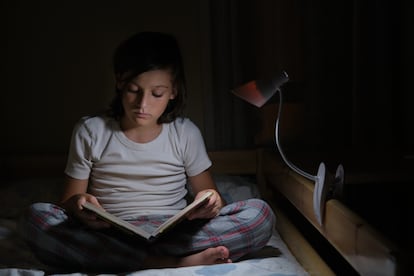Why are so many teenagers so sleep-deprived?
Young people should sleep nine hours a day without interruption because they are in full hormonal effervescence and metabolic change. However, most do not do so and have a poor quality night’s rest, leading to consequences such as headaches and decreased attention span

Babies are not the only ones who need ample and restful rest. Adolescents between the ages of 13 and 18 also need it: they should get at least nine hours of sleep at night. But different factors make that difficult, including the use of technological devices at night. Young people between the ages of 13 and 18 are undergoing significant “hormonal, metabolic and neuropsychological processes, many of which occur during sleep,” explains Darío Fernández, a physician and clinical psychologist expert in sleep medicine.
Young people who do not get enough sleep face an array of consequences: “Altered metabolism, predisposition to sedentary lifestyles, headaches, gastrointestinal problems, obesity and diabetes, as well as difficulty in learning and memory function,” says Fernández. Lack of quality sleep also affects their behavior. “Fatigue reduces the desire to socialize and causes irritability, lack of motivation, negativity, lack of initiative and predisposes to depression in adulthood,” adds the specialist.
The impact of technology on sleep
Cell phones are addictive and negatively impact youth’s sleep. These devices have lights on their screens that “inhibit the secretion of melatonin (sleep hormone), which prevents them from falling asleep, reduces the hours of rest and generates restlessness,” explains Fernández. The psychologist highlights other reasons why sleep can be disturbed at this age: “It is usually the time when the consumption of so-called soft drugs — such as alcohol, coffee, tobacco or stimulant drinks — begins, as well as hormonal processes involving the search for identity and rebellion against rules, including bedtime.” Other causes for a lack of quality sleep may include:
- Irregular schedules, which they try to compensate with more hours of rest on weekends to make up for the lack accumulated during the rest of the week.
- Naps of more than 30 minutes that take place late in the day.
- Not knowing the importance of sleep, as many children may see it as a waste of time.
The peculiarities of young people’s sleep
Adolescents have certain peculiarities when it comes to sleep, which are determined by their maturation process. “A delayed circadian rhythm,” or a delayed internal clock, causes melatonin to be released later, making an adolescent reluctant to go to sleep and wake up at a reasonable hour, explains Fernandez. The expert also mentions other causes, such as having an irregular sleep pattern, which generates poor sleep quality due to the shorter REM (rapid eye movement) phase. This is the time, he explains, when rest is most restorative.
Maintaining what specialists call “proper sleep hygiene” is the basis for adolescents to have a good night’s rest, which has a positive impact on their health. “Having regular bedtime and wake-up times, creating a quiet environment before going to bed, limiting physical activity in the afternoon, limiting the use of mobile devices and understanding the importance of a good night’s rest for health are some of the recommendations,” says Fernández.
Food also promotes restful sleep. “There are substances that promote rest, such as tryptophan, which is transformed into melatonin and is found in foods such as cherries, bananas, milk, meat, oily fish and nuts,” continues the expert. He also mentions some substances that should be avoided: “Foods or drinks with caffeine, chocolate, ice cream, sweets. For dinner, it is better not to eat spinach, chard, red meat, sausages, cured cheese, legumes or tomatoes.”
Lost sleep can’t be recovered
Young people do not feel tired because they do not get enough sleep. “At 15 years of age, they do not perceive body fatigue, but [it manifests in] a worse school performance or [in] extreme moods, such as sadness, nervousness or irritability,” explains Ana Pérez, member of the Sleep and Chronobiology Group of the Spanish Association of Pediatrics. This specialist warns that lost sleep cannot be recovered and fatigue accumulates in the body, with the consequent risk that scarce rest of poor quality will become chronic and the adolescent will end with insomnia problems as an adult.
There are a number of signs that may point to how a lack of sleep is interfering with the development of the adolescent’s life. “Taking naps, which in general is not normal at this age, feeling tired and distracted at school; their academic performance may worsen and [they may have] an unstable mood, with a tendency to irritability,” continues this specialist. In these cases, she advises consulting a family physician.
Sign up for our weekly newsletter to get more English-language news coverage from EL PAÍS USA Edition
Tu suscripción se está usando en otro dispositivo
¿Quieres añadir otro usuario a tu suscripción?
Si continúas leyendo en este dispositivo, no se podrá leer en el otro.
FlechaTu suscripción se está usando en otro dispositivo y solo puedes acceder a EL PAÍS desde un dispositivo a la vez.
Si quieres compartir tu cuenta, cambia tu suscripción a la modalidad Premium, así podrás añadir otro usuario. Cada uno accederá con su propia cuenta de email, lo que os permitirá personalizar vuestra experiencia en EL PAÍS.
¿Tienes una suscripción de empresa? Accede aquí para contratar más cuentas.
En el caso de no saber quién está usando tu cuenta, te recomendamos cambiar tu contraseña aquí.
Si decides continuar compartiendo tu cuenta, este mensaje se mostrará en tu dispositivo y en el de la otra persona que está usando tu cuenta de forma indefinida, afectando a tu experiencia de lectura. Puedes consultar aquí los términos y condiciones de la suscripción digital.









































